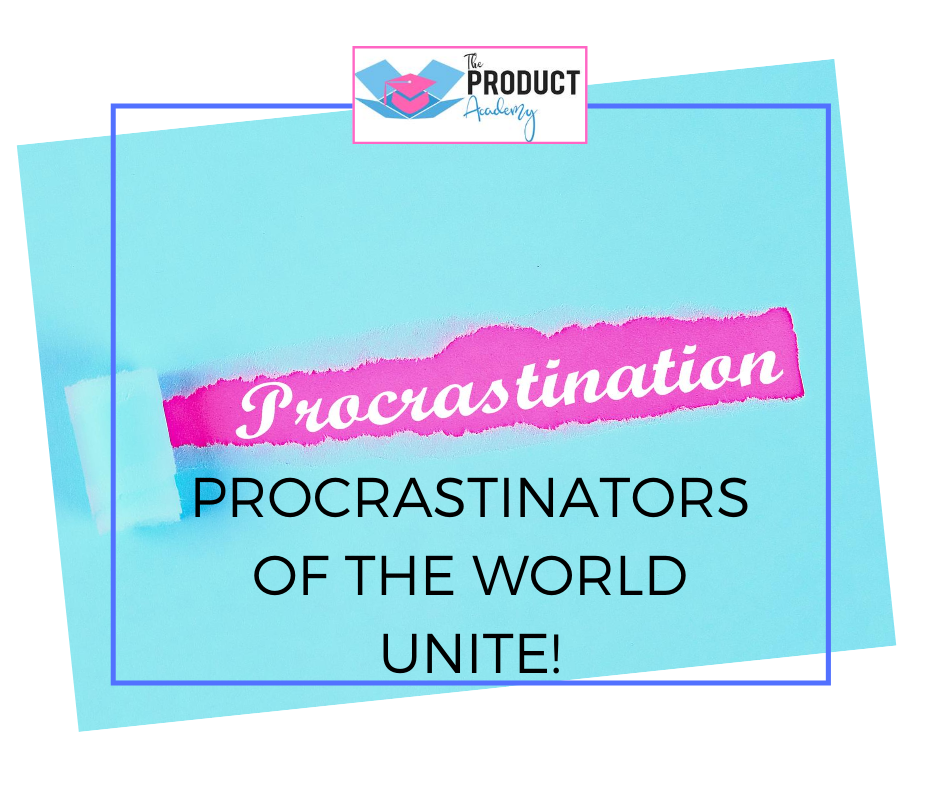
Why do today what can be put off until tomorrow?!
Procrastinators of the world unite!
I swear if procrastination was a sport, I would have a Team GB sweatshirt.
I am a master procrastinator.
Why do today what can be put off until tomorrow?
At uni, I was the up-all-night-before-the-deadline essay writer.
At work, I was the day before presentation submitter.
If you are a procrastinator, welcome – we share a spirit animal.
I burn my dinner far more often than is socially acceptable at my age. I watch 2 or 3 TV programmes at once, switching channels at each break. (Easily bored sits quite closely with easily distracted!) I forget what I am getting ready for and start reading articles on topics of zero relevance to my life.
Having a deadline focuses my mind on the task in hand and somehow keeps the distractions under control.
Unfortunately, not all jobs do have a deadline. Some jobs are just things you should or could do – but usually don’t ![]()
And therein lies the problem I think.
Should.
Such a soft innocent-sounding word.
But really, on the inside, it’s just judgy and mean.
Should is a procrastinators kryptonite. Should is all the ideas we think would make us more successful, happier, better and yet we aren’t doing.
- I should clean my car today.
- I should sort out my bike so I go cycling later.
- I should write my latest blog.
- I should launch that new product I have been thinking about for ages.
So if we think all these things are going to be good for us, why don’t we do them?
- We don’t really know how to do it
- We don’t think it will be enjoyable to do
- We don’t really believe doing it will be worth the effort it may take
Sometimes, all 3 are connected – if we don’t know how to do something, it’s probably going to be difficult. Difficult isn’t much fun and it will take longer than it would otherwise and is it really worth all that effort?
But on the flip side, if something is a lot of fun and completely pointless, well we’ll probably do it anyway! In fact, it doesn’t always have to be fun, just being easier is usually enough.
- Doing the housework instead of updating your website?
- Watching terrible TV instead of setting up a Facebook ad?
Tick and Tick.
Take this blog. I have wanted to write this blog and a number of others for a while now but haven’t got around to it.
Why?
Mostly I have too many thoughts in my head and the idea of having to figure them all out and structure them in a way that makes sense to other people felt like a lot of hard work. And then, would I really promote them enough to actually make them worthwhile?
And yet, here I am finally writing it. How I hear you cry? How are you doing it?
Firstly, I created a deadline for myself by hiring a VA to format and upload them on to my website for me. (Thank you Tonya!). Now I’m paying her for her time, I need to use it.
But even after I hired Tonya, it has taken me a week to get around to actually doing it.
However, today I realised that if Tonya reads them as she’s uploading them and they make no sense, she will just tell me and I can edit them until they do. Just knowing that has made it so much easier. I can type away and the words are flowing because my brain isn’t caught up worrying about anything else. And now it’s so much fun, this is actually my second blog of the day!
If you’re forever putting something off, ask yourself how you feel about the ‘thing’?
Do you just look at it and don’t know where to start? It feels like a mountain and even though you know one-step-at-a-time that’s not really helping because you can’t decide where is it best to make that first step be the right step.
Looking at the top of a mountain can give you a neck-ache. So don’t look at the summit. Forget the summit. Your very, very, very, first step on a mountain does not determine whether you are on the fastest, easiest, or riskiest path to the summit. Your first step just gets you out of the tent looking at the weather. Take that step. In fact, forget the step, just put your boots on. Or put your socks on.
There are a thousand tinier steps than you think that will still get you moving. Once you find that tiniest possible step you could take, the next step will be a lot more obvious. And then you can keep going with those tiny, baby steps until you don’t know what the next step is again. And then you can go back to tiny. I wrote a blog on milestones a while ago – if stopping and starting is your procrastination flavour, it might be worth a look.
Maybe deep-down you feel like you should care about the thing but if you’re honest, you just don’t.
If you do care but come to the conclusion now just isn’t the right time, create a Car Park. Create a physical place, such as a section of a book, a big section of your whiteboard or even a box and put your ideas in there. Your brain will have an easier time letting go of it, if it knows it’s safely stored somewhere else. And then it can stop being that creepy lurker in your mind.
What if you think it’s really important, you do know how to do it but frankly, it’s just boring?
Could you eat cake whilst you do your bookkeeping? Could you watch a boxset whilst you research your new product? (You can always replay when you realise you have no idea what’s going on!)
I once knew someone who submitted their monthly expenses once a year. They knew 100% that if they did it each month it would be quicker and less painful but no, instead every single year it all piled up and became a complete nightmare to untangle what got spent when and where.
In the end, I introduced an expenses app and a competition just to make it a little more fun to do.
Could you ask someone to help? Maybe an accountability buddy or maybe an expert in the subject who can advise you on an easier way.
So what’s the answer?
I am still wearing my Team GB Master Procrastinator sweatshirt – not with pride necessarily but with a sense of ownership at least. I highly recommend accepting that it’s just part of life and not beating yourself up for it. Unless you’re procrastinating over things like feeding your kids or your pets or going to work, (in which case, I’m not sure that’s procrastination…!) what’s the worst that could happen?
There are things that can help though.
Realistic time expectations
How important is it to do it?
Take baby steps
Procrastination over writing a blog or webpage? Just focus on the first step of opening whatever software you write in. If that feels hard, just focus on getting in front of your laptop!
I hate swimming. Well not strictly, true. I am scared of swimming. When I see water, whether it’s pools, the sea, lakes I love the idea of diving in and swimming. But, the thought of actually going swimming makes my stomach churn and my head go dizzy.
On the rare occasions, I manage to find myself in the sea or in a pool, I can enjoy it if allowed to do it at my own pace and the water doesn’t go up my nose! But the process of getting there makes me so stressed, I only really manage it on holiday.
In 2013/2014, I lived in Munich for 6 months. I absolutely loved it! If you’ve never been, it’s the most amazing place and I 100% recommend it.
Whilst there, I was very lucky to work walking distance from the Olympic Park, which still had the sporting facilities in place – including the incredible 50m pool. All my friends would go regularly but it brought me out in a cold sweat. Until one day, I packed my swimming kit and took it to work. That was it. No further commitment to the process than that.
I forgot about it all day, didn’t tell a soul I had my kit. At the end of the day, I walked down the stairs and out of the front door and decided to turn right instead of left. In the direction of the pool. It’s a nice walk, so I focussed on the views and the fresh air and the exercise I was getting. And then I got to the park and I just focussed ongoing inside the pool building to take a look. And then figuring out how to get the right admission in German. And then finding the changing room….
At no point from packing my bag in the morning until the moment I took my first stroke in the pool, did I think about actually swimming? Not once. And yet, there I was swimming. And not hating it. Not having a meltdown in panic. Just swimming.
And every Wednesday from then on, I followed the exact same process. I just focussed on turning right instead of left. If I managed that literal first step, I would get it in the pool. So that is the only thing I had to commit to.
I use the same principle all the time now. It’s like breaking a deadlock. Picking something innocuous and easy, just moves my headspace to somewhere new. The next step is then so obvious and easy and so on.
So make your list, get rid of the unimportant stuff, and then pick the smallest step you can imagine that takes you vaguely towards something that does matter to you. And just see where you end up! ![]()

